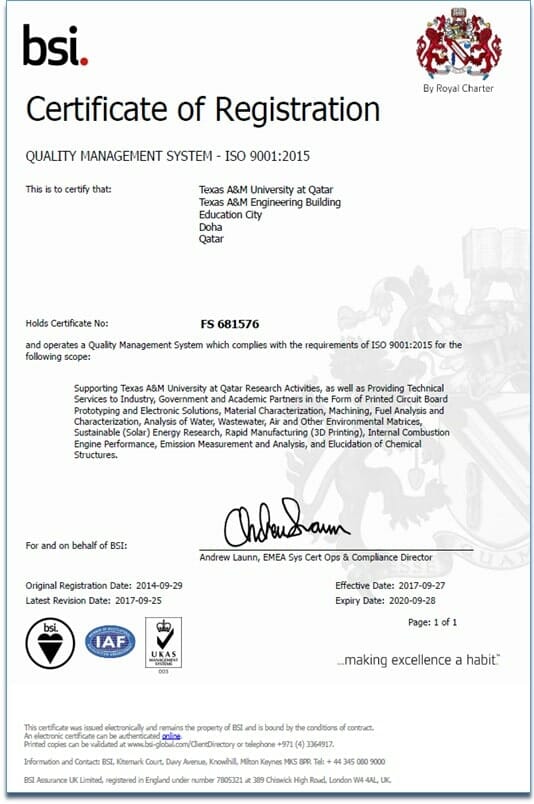Fuel Characterization Laboratory
Texas A&M University at Qatar’s Fuel Characterization Laboratory (FCL) is built to support both research and teaching activities in the area of formulation and characterization of fuels and value-added chemicals. It is a
The FCL is currently used for the development of future generations of synthetic fuels obtained from natural gas using GTL technology, and the comparison of these fuels with conventional fuels obtained from petroleum resources. The FCL is equipped with advanced analytical equipment to measure both physical and chemical properties of fuels and value-added chemicals. The lab is equipped with over 30 types of analytical equipment including advanced Gas Chromatographs (GCs) that are capable of identifying the chemical composition of all species existing in fuels. Furthermore, the FCL is equipped with the necessary facilities to formulate new fuel blends via the use of additives.
The work conducted in this lab adheres to a sophisticated data quality control system and safety regulations developed with the support of our industry partners. This system ensures that the equipment, testing procedures and data recording in the FCL comply with international standards set by the American Society for Testing and Materials (ASTM). The FCL is ISO 9001:2015 Certified. In addition, the FCL hosts a number of projects representing a unique collaboration between world leading companies in fuels and engine manufacturing, and academic institutions around the globe. Collaborators are Shell, GE (Oil& Gas), OryxGTL, Qatar Airways and others. Over 25 graduate and undergraduate researchers were trained in the facility since 2009.
Design Approach of GTL Synthetic Fuels
The overall scope of our work is to identify the chemical components for making synthetic fuel blends that satisfy specific product needs (e.g. gasoline, diesel, jet fuel) and provide ultra clean fuels. We aim to develop experimental protocols for
Fuel Characterization Lab Quality Management System
FCL Objective is to produce technically supportable laboratory test results that accurately and precisely describe the sample for the purpose of reporting to the internal and external customers. FCL has developed a quality management system that

Fuel characterization laboratory capabilities
Test
Manufacturer/Model
Description
Test Method
Equipment
Gas Chromatography (GC-FID)
Agilent / 7890A
Composition and concentration of fuel
ASTM D 2887

Gas Chromatography (DHA)
Perkin Elmer / Clarus 500
Composition and concentration of fuel
ASTM D 6730

Gas
Agilent / 7890A + 5975C
Composition and concentration of fuel
Custom method

2-D Gas Chromatography (GCxGC)
Agilent/ 7890A + EPC Modulator
Comprehensive two dimension Gas Chromatography
Custom method

Gas Chromatography (online GC-FID)
Shimadzu/2010
Composition and concentration of online product from Fisher Tropsch Reactor
Custom method

Automatic Distillation
Petrotest Instruments GmbH /ADU 4+
To determine the boiling range of fuel sample
ASTM D 86

Copper Strip Corrosion
Anton Parr ProveTech GmbH/ OBA 2 & PA5
To detect the corrosiveness to copper (or silver) of aviation gasoline or other hydrocarbons
ASTM D 130

Density
Anton Paar / DMA4100
To measure the Density
ASTM D 4052

Dynamic & kinematic Viscosity
Anton Paar / SVM 3000
To measure the dynamic and kinematic viscosity of fuel Sample
ASTM D 7042

Sulfur Analyzer
Mitsubishi Chemical Analytech Co. LTD/ TS-100V
For sulfur content of fuel
ASTM D 5453

Electrical Conductivity
Emcee Electronics /
Model 1153
To measure the Electrical conductivity
ASTM D 2624
Fluorescent Indicator Adsorption
Anton Parr ProveTech GmbH/
13-0930
To determine
ASTM D 1319

Flash Point
Petrotest Instruments GmbH/ TAG 4
Measuring the flash point of fuel
ASTM D 56

Flash Point PM
Stanhope-Seta / PM93
for measurement of flash point of hydrocarbon liquid
ASTM D93

Cold flow properties analyzer
Phase Technology /
PSA-70Xi
Phase properties of fuel (freezing, pour and cloud point)
ASTM D 5949 / 5773 / 5972

Freezing Point (manual)
Petrotest Instruments GmbH/ K2276
To measure the freezing point of fuel
ASTM D 2386

Heat Content
Parr Instrument Co/
6200EF
Net Heat content of fuel
ASTM D 240

Lubricity Automated BOCLE System (ABS)
PCS INSTRUMENTS
To assess the lubricity of jet and diesel fuels
ASTM D 5001
ASTM D 6078

Moisture Content
MITSUBISHI CA-200 MOISTURE ANALYZER
To measure the moisture content of fuel sample
ASTM D 6304

Total acid number
Petrotest Instruments GmbH /
17-0695
For the determination of acidic constituents in petroleum products
ASTM D 664

Octane Number
Zeltex Inc. / ZX-101XL
To measure Octane number of fuel sample
ASTM D 976

Oxidation Stability
Petrotest Instruments GmbH/ OBA 2 & PA5
For the determination of the stability of Fuels under accelerated oxidation conditions.
ASTM D 525 / 873

Saybolt Color
Petrotest Instruments GmbH/
S-160180
Color property of fuel
ASTM D 156

Smoke Point
AD Systems/
SP10
Smoke point detector
ASTM D 1740 / 1322

Vapor Pressure
Grabner Instruments /
MINIVAP VPXpert
For determination of the vapor pressure of fuels
ASTM D6378

ICP-OES
PlasmaQuant PQ 9000
Determination of additive elements
ASTM D 5185




